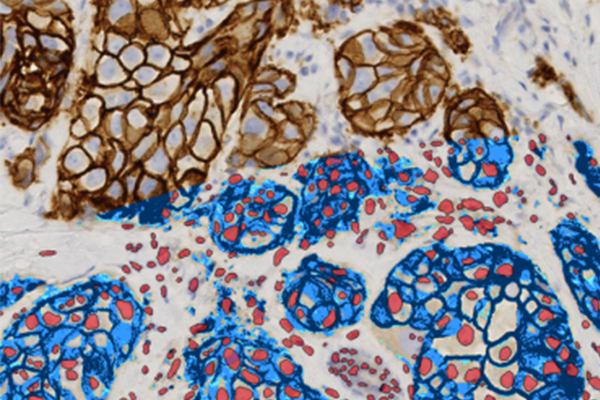Proscia is Teaching Computers to Beat Cancer

For 150 years, pathologists have used glass slides and microscopes to analyze tissue samples, understand cancer and determine the best course of treatments. One Baltimore startup, however, is ushering this process and the whole field of pathology into an era of computational pathology.
Founded in 2014 by Johns Hopkins undergraduates, Proscia began developing data management applications that enable researchers and pathologists to upload, extract and manipulate data, and telepathology solutions that allow a large number of people to analyze the same slide at the same time from different locations around the world.
“Pathologists analyze billions of slides each year, and almost every single one of those is analyzed under a microscope,” says Proscia CEO David West. “In the next couple of years, a huge chunk of those images will be digitized before they’re looked at by a pathologist. This represents one of the biggest trends in big data in medicine ever.”
When West says big data, he isn’t exaggerating. Despite the tissue samples fitting onto a 1-inch-by-3-inch slide, their digital high-resolution images are about a gigabyte each. The large files allow researchers and pathologists to enlarge the images to 20 to 40 times their original size and clearly examine components of individual cells.
“It’s such an ungodly amount of information, and in every one of those images is a little piece of the puzzle of cancer,” West says. “What we want to do is start unlocking that.”
A few months ago, Johns Hopkins signed on as a Proscia client, enabling the institution’s pathologists and other researchers to access and tap into pathology data from across the institution. Proscia’s technology also powers Johns Hopkins’ Surgical Pathology Unknowns database. Each week pathology residents receive six to eight unknown surgical pathology cases. These cases typically comprise both classical and unusual lesions seen in surgical pathology the previous week, providing a tremendous learning opportunity.
Though Proscia initially focused product development on the research market, it has increasingly invested in developing image analysis solutions that would benefit pathologists in a clinical setting. The technologies in this sector use computer vision and machine learning to enable pathologists to make more informed and more accurate decisions about the severity of a patient’s cancer and the best course of treatment.
Though Proscia has invested in this area for about a year, the market for these technologies became more attractive in April when, for the first time, the Food and Drug Administration (FDA) approved the first Whole Slide Imaging system for primary diagnostic clinical use in pathology. According to the FDA, this system facilitates the “review and interpretation of digital surgical pathology slides from biopsied tissue.”
“The FDA approval lays the groundwork for the transition from pathology to digital pathology to computational pathology,” says West, who graduated from The Johns Hopkins University in 2016 with a degree in biomedical engineering and a focus on computational biology. “It makes it a good time to be in this space.”
Continue reading on Johns Hopkins Technology Ventures.
